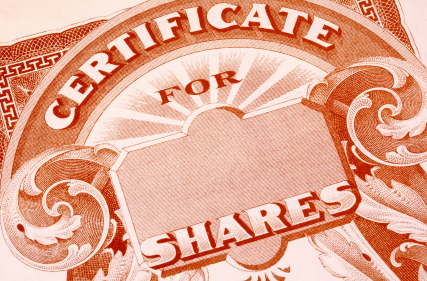How to Start Trading Shares
Dealing in shares can be an exciting and profitable pursuit, and it’s unusual to find a trader who is anything other than fanatical about their investing. For those just getting started, share dealing can seem like a daunting process, with a vast jargon to get a hold of and seemingly endless ticks and price movements flashing consistently across the trading board – for the uninitiated, getting over this first hurdle can seem impossible.

Why Trade Stocks?
Shares are assets, traded to the value of billions every single day on organized stock exchanges across the world. When most of us imagine the day-to-day life of a trader, we picture a high-pressured environment where shares can rapidly rise and fall in the blink of an eye, making and losing fortunes depending on the positions of the individual trader. If this is really the case, why do traders bother with shares in the first place, and how does speculating on share price differ from other forms of speculation or even gambling?
Shares are distinct from gambling in a number of key ways, and their price volatility is in fact a strength, rather than a weakness. While, of course, wildly sliding prices don’t do share buyers any favours, it nevertheless allows traders to make vast sums of money on the downside as well as the upside, depending on their positions, and makes shorter term trading viable. Shares, unlike any other tradable asset, allow the investor to make gains over the space of years, months, days and even hours, and the volatile movements they bring exaggerate this effect to make trading potentially highly lucrative.
Shares in themselves have a residual value, unlike a bet or wager (and even in some respects unlike other traded products), which means they will always retain some value. They are a proportion of ownership of the company to which they relate, and while one share will usually be worth very little in terms of profit-share and influence, it is nevertheless a right which someone will usually always be interested in maintaining should you choose to sell.
Publicly traded shares can be sold at any time for their market value, even where there is no directly corresponding buyer waiting in the wings. This function is performed by the market maker, who is usually a large investment institution with the capital resources to pick up on shares smaller investors don’t immediately want to buy – because price movements are often cyclical, the market makers are often able to hold shares for a limited period of time and negotiate separately with the exchange for the services they provide, allowing traders to seamlessly buy and sell their shares (in stark contrast to most other types of investment, where a corresponding party may be necessary to complete a trade).
How to Begin Trading Shares
Getting started with share trading is easier than it might at first appear. From a technical perspective, all you really need to get to begin is an account with an online broker (learn what you need to know to choose the right stockbroker) and some capital to make your first tentative steps into the fast-paced world of investing.
It’s also highly recommended that you begin trading shares with a demo, or virtual account. This will allow you to get a better feel for the broker platform on which you’ll spend much of your trading time, and give you the chance to put your theory into practice before risking any of your real-life capital. While it’s hard to judge the best point at which to leave the virtual and enter the real trading environment, a good rule of thumb is to try and make your initial mistakes when playing with virtual money, and only to make the switch when you feel comfortable with both the interface and your trading logic.
Ahead of your first few trades, choose markets and sectors within which you can get to know the major players and how their share prices interact with each other and wider economic factors. Narrow down your trading portfolio in the first instance to allow you to become more comfortable with the way the markets move, to increase the chances of landing successful positions sooner rather than later.
First getting started as a trader marks the successful passing of your first major hurdle, but nevertheless remains some distance away from your end goals. As a trader you are consistently learning from your mistakes, and hopefully mitigating the inevitable losing positions when they arise. But with a cautious approach to maintaining your capital and an applied reason and logic behind your trading decisions, you should ultimately start to get into the swing of things and trade on a more consistent and ideally profitable footing.
Starting Out

But because of the dynamism and the human element to trading, not to mention the vast array of variables that factor in to calculating a share’s price, moving with the markets is a seriously difficult task that carries appropriate rewards for those that manage to get it right.
As a new trader starting out, there’s very little you can do to stem the tides of the markets when they move against you, and it is inevitable that you will open losing positions from time to time. However, by ensuring you invest both your time and energies in preparation for trading, including researching and learning about the markets in which you wish you trade, and take adequate steps to preserve capital and minimize your losses when they do occur, you’re working towards building more stable foundations on which to base your future trading success.
Share dealing is often thought of as a means of making money, of speculation, rather than a profession. In fact, it is a discipline that requires an investment of both capital and intellect in order to achieve any degree of success. Becoming a successful share trader requires knowledge of how markets and shares work, along with a keen and consistently developing understanding of current affairs and market shaping events.
Share dealing is much more difficult than it might seem, and the process of learning how to trade successfully is often paved with hard work and expensive, unfortunate mistakes. So what constitutes the most effective path to learning how to trade profitably, and how can the inevitable losses best be avoided along the way?
Research the Trades
The first step in learning how to trade shares successfully is research. Only those that understand how and what they’re trading can expect to see success long-term, and unless you’re coming from a financial background, there’s much to learn. Read up on market theory, knowledge and practices, because there is no time to learn this stuff on the job.
The preparation that goes in to learning how share and stock markets work is an essential pre-requisite to thinking about strategy and market approach, and the best path to share dealing always starts with laying solid informational foundations. In practice, both new and experienced spread bettors continue to learn as they trade and experience new market challenges, and there is no substitute for research and understanding when it comes to trading your capital profitably.
Follow the Markets
Research isn’t a preparatory burden only – any successful share trader needs to keep a constant perspective on market news and events on a day-to-day, hour-to-hour basis. This means following and reading the markets through their ups and downs and reading up on the latest events and circumstances that shape the way the markets behave.
Before contemplating trading your capital, it’s important to follow the markets and the news cycle and draw your own parallels and experiences to shape future trading decisions. Keeping on top of the markets and following goings on as you learn and develop as a trader can serve in some part to compensate your lack of market experience, and the more you immerse yourself in the markets prior to trading, the more likely you are to develop positive trading behaviours.
Trade Shares In Demo while Learning
With research ongoing, there can be no better way to test strategies, interact with the markets and generally familiarise yourself with the practicalities and the ups and downs of trading the markets than through trading a demo account. Demo accounts enables traders to invest in the real shares markets, only with virtual transactions and virtual liabilities – the perfect save-haven for learning your craft. Trade through a demo account as soon as you feel you’re ready to approach the markets, and trade as consistently and as realistically as you can. After all, demo accounts are only useful when they are used as an educational trading tool, rather than an excuse to trade in an unrealistically risky or gung-ho way.

